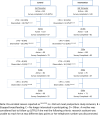The effect of lactation educators implementing a telephone-based intervention among low-income Hispanics: A randomised trial
- PMID: 26941454
- PMCID: PMC4771064
- DOI: 10.1177/0017896914542666
The effect of lactation educators implementing a telephone-based intervention among low-income Hispanics: A randomised trial
Abstract
Objectives: To assess whether a phone-based breastfeeding intervention delivered by lactation educators influenced exclusive breastfeeding rates amongst low-income Hispanic women in the USA.
Design: Randomised two-group design.
Setting: Pregnant low-income Hispanic women (298) were recruited from community health clinics in Los Angeles County (USA) and randomly assigned to either a control or an intervention group.
Methods: Data relating to the factors associated with breastfeeding were collected during the third trimester. Breastfeeding outcome data was collected at 72 hours, one month, three months, and six months postpartum.
Results: There were no differences between the groups in rates of breastfeeding initiation. There was a significant difference in the duration of exclusive breastfeeding among participants during the infant's first week of life. While not significant, after controlling for covariates and intent to breastfeed at third trimester, the duration of exclusive breastfeeding amongst all participants was, on average, longer for intervention group mothers than control group mothers. Additionally, , the intervention group mothers were more likely to report exclusive and only breastfeeding at all data points compared to the control group, and less likely to discontinue breastfeeding.
Conclusion: Findings from this study suggest that telephone-based breastfeeding interventions delivered by a lactation educator show promise as a cost-effective strategy for improving both the quantity and duration of breastfeeding among low-income Hispanic women in the USA. Intervention group mothers not only sustained breastfeeding for a longer durations, but also provided their infants with greater amounts of breast milk over these longer durations.
Keywords: Lactation education; USA; effects; low income; telephone intervention.
Figures
References
-
- Aarts C, Kylberg E, Hörnell A, Hofvander Y, Gebre-Medhin M, Greiner T. How exclusive is exclusive breastfeeding? A comparison of data since birth with current status data. International Journal of Epidemiology. 2000;29(6):1041–1046. - PubMed
-
- Ahluwalia IB, D'Angelo D, Morrow B, McDonald JA. Association between Acculturation and Breastfeeding among Hispanic Women Data from the Pregnancy Risk Assessment and Monitoring System. Journal of Human Lactation. 2012;28(2):167–173. - PubMed
-
- Anderson AK, Damio G, Young S, Chapman DJ, Pérez-Escamilla R. A randomized trial assessing the efficacy of peer counseling on exclusive breastfeeding in a predominantly Latina low-income community. Archives of Pediatrics & Adolescent Medicine. 2005;159(9):836–841. - PubMed
-
- American Public Health Association . A call to action on breastfeeding: a fundamental public health issue. Washington, DC: 2007. [June 12, 2014]. Policy Number 200714. Available at: http://www.apha.org/advocacy/policy/policysearch/default.htm?id=1360.
-
- Bartick M, Reyes C. Las dos cosas: an analysis of attitudes of Latina women on non-exclusive breastfeeding. Breastfeeding Medicine. 2012;7(1):19–24. - PubMed
Grants and funding
LinkOut - more resources
Full Text Sources
Other Literature Sources


